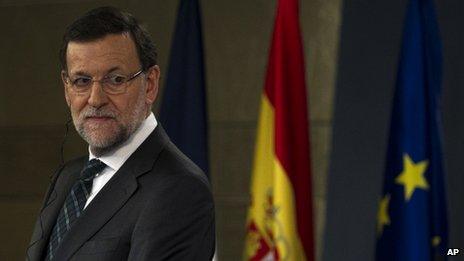'A question of trust'
- Published
Sometimes, indeed routinely, parliamentary debate generates disparity of opinion. On this occasion, among Alex Salmond's opponents, there was unanimity.
They were all agreed that the FM was in trouble over the issue of membership of the European Union, post independence.
So what else is new, I hear Nationalist interlocutors cry? Of course the opposition parties agree: they are in Better Together for the purpose of jointly thwarting Mr Salmond's aims.
True, true, eminently true. But on this occasion they were each pursuing a precise aspect of the European Union question. The comments delivered by Mariano Rajoy, the Prime Minister of Spain.
The Spanish PM said that a region which left a member state would be outside the EU.
The clear implication of this was that an independent Scotland would require to negotiate accession and terms from outside the European club, not from within as the Scottish government argues.
Representing Spain, Sen Rajoy had been in talks with France in the shape of her president. But he was asked about Scotland in the aftermath of the White Paper.
Why? Is it the case that they talk of nothing else in Madrid? No - but it is a pretty hot topic in the media in Barcelona.
Catalan Nationalists are rather keen on a Scotland-style referendum. Madrid says they cannot do so under Spanish constitutional law. So there is context here.
Sen Rajoy was giving an answer about Edinburgh - but delivering a message to Barcelona.
Whatever the motivation, Labour's Johann Lamont, Ruth Davidson of the Conservatives and Willie Rennie of the Liberal Democrats reckoned it was a big problem for Mr Salmond.
Spain, they said, is a member state - and thus would have a veto on any Scottish accession.
Mr Salmond replied that he had a letter from the secretariat of the European Commission. He did indeed. But it was not written to him.
Rather it emerged later that it was lifted from the internet, having been addressed in response to an unnamed interlocutor.
Cue Opposition derision. Still, setting that aside for a moment, what did the letter say?
That it would be "legally possible" to renegotiate the situation of the UK and Scotland within the European Union.
Precisely Mr Salmond's point - or one of them. However, the letter when it emerged went on to say that such a scenario would require a change in EU Treaties - which would require unanimity among all member states.

The row was prompted by comments from Spanish Prime Minister Mariano Rajoy
Cue opposition attack.
Did that not reinforce the point about a potential Spanish veto? Did it not prove that Spain - again, however motivated - could prevent such negotiations taking place?
Enter Sir David Edward, former judge on the European Court of Justice.
He told me the UK government would have a duty in the event of a "Yes" vote to continue to represent the interests of Scotland as well as the remainder of the UK up to the point of independence actually taking place.
Further, he said Scottish accession would not present insuperable difficulties - although the negotiations themselves would not necessarily be easy, either for Scotland or for rUK.
Mr Salmond's core argument is that Scotland would be a welcome member of the EU on a number of grounds.
These are set out in the 100-page document on this issue published yesterday by the Scottish government. (It has been a big week for weighty tomes.)
That drew upon three points: one, that negotiation was feasible from within the Treaties; two, that Scotland was bringing a lot to the table in terms of resources (all the oil, all the Scotch, most of the fish, what's not to like?); and, three, that the European Union was intuitively a democratic institution and would respect the democratic wishes of the people of Scotland.
Which is, of course, rather a long way from the original argument that Scottish membership of the EU would be, in effect, automatic.
It is now, as so often in politics, a question of trust.